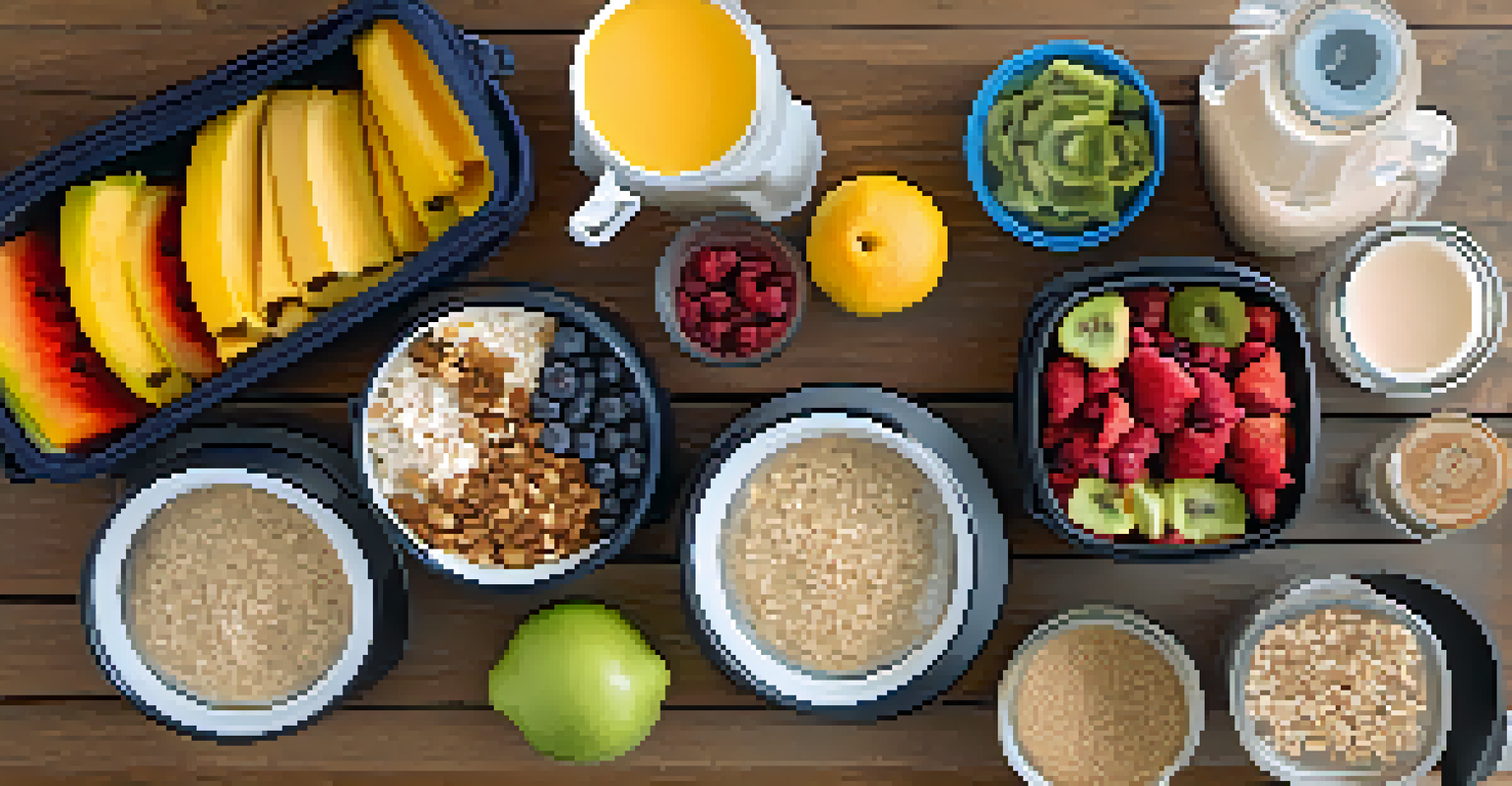The Role of Nutrition in Enhancing Climbing Performance

Understanding the Importance of Nutrition for Climbers
Nutrition plays a pivotal role in a climber's overall performance and recovery. Just like a car needs the right fuel to run efficiently, climbers require a balanced diet to maintain energy levels during their climbs. Proper nutrition not only helps in building strength but also aids in mental focus, which is crucial for tackling challenging routes.
Nutrition is not just about eating. It's about learning to live.
For climbers, the right balance of macronutrients—carbohydrates, proteins, and fats—is essential. Carbohydrates serve as the main energy source, while proteins help in muscle repair and recovery. Fats, though often overlooked, provide long-lasting energy, especially for long climbs.
Ultimately, understanding the importance of nutrition allows climbers to enhance their performance, reduce injury risks, and improve recovery times, making it a fundamental aspect of any climbing regimen.
Key Nutrients for Optimal Climbing Performance
When it comes to climbing, certain nutrients stand out as particularly beneficial. Carbohydrates are crucial for quick energy, while proteins support muscle repair and recovery. Additionally, micronutrients like vitamins and minerals play significant roles in maintaining overall health and muscle function.

For example, calcium and vitamin D are essential for bone health, which is vital for preventing fractures during climbing. Iron helps transport oxygen in the blood, enhancing endurance. A deficiency in any of these nutrients can lead to decreased performance and increased fatigue.
Nutrition Fuels Climbing Success
A balanced diet of macronutrients is essential for climbers to maintain energy, enhance performance, and aid recovery.
By understanding these key nutrients and incorporating them into your diet, you can significantly improve your climbing capabilities and overall well-being.
Hydration: The Unsung Hero of Climbing Performance
Hydration is often overlooked in discussions about climbing nutrition, yet it is critical for performance. Dehydration can lead to fatigue, decreased strength, and impaired coordination, all of which can hinder your climbing ability. Staying properly hydrated ensures that your body functions optimally during climbs.
You are what you eat, so don’t be fast, cheap, easy, or fake.
A good rule of thumb is to drink water regularly throughout the day and monitor your hydration levels. Signs of dehydration may include dry mouth, fatigue, or dark-colored urine. It's especially important to hydrate before, during, and after climbing sessions to replenish lost fluids.
Incorporating electrolyte-rich drinks can also help maintain hydration, particularly during intense climbing sessions. This balance keeps your energy levels up and your focus sharp, allowing you to perform at your best.
Pre-Climb Nutrition: Fueling Your Body for Success
What you eat before climbing can significantly impact your performance. A well-balanced meal or snack that includes complex carbohydrates and proteins can provide sustained energy throughout your climb. Aim to eat 1-3 hours before your session to allow for proper digestion.
For instance, oatmeal with fruits or a whole-grain sandwich with lean protein can be excellent choices. These foods release energy slowly, helping to prevent energy crashes during your climb. Avoid heavy or greasy foods, as they can lead to discomfort while climbing.
Hydration is Essential for Performance
Staying properly hydrated prevents fatigue and maintains strength and coordination during climbs.
Planning your pre-climb nutrition is essential for maximizing performance and ensuring that you feel energized and ready to tackle your climbing challenges.
Post-Climb Nutrition: Recovery and Replenishment
Just as pre-climb nutrition is important, post-climb nutrition is crucial for recovery. After a climb, your body needs to replenish glycogen stores and repair muscle tissue. This is where a good post-climb meal or snack comes in, ideally consumed within 30 minutes after climbing.
A combination of carbohydrates and proteins is ideal—think a protein shake with a banana or a turkey wrap. These foods help jumpstart your recovery process, allowing your muscles to heal and reducing soreness. Additionally, rehydrating with water or an electrolyte drink is vital to replace lost fluids.
By focusing on post-climb nutrition, you can speed up recovery times, which means you're ready for your next climbing adventure sooner!
Meal Planning for Climbers: A Strategic Approach
Meal planning is a game-changer for climbers looking to optimize their nutrition. By preparing meals in advance, you ensure you have access to balanced options that support your climbing goals. This helps you avoid the temptation of quick, unhealthy snacks when hunger strikes.
Start by planning your meals around your climbing schedule. Include a mix of macronutrients and don’t forget to account for snacks! For example, packing energy bars made from nuts and dried fruit can provide a great boost during long climbing sessions.
Meal Planning Boosts Climbing Nutrition
Strategically planning meals and snacks helps climbers avoid unhealthy options and ensures they have the right nutrients to support their climbing goals.
With a little effort in meal planning, you can maintain consistent nutrition that fuels your climbs and supports your overall health.
Listening to Your Body: Tailoring Nutrition to Your Needs
Every climber’s nutritional needs can vary based on factors like intensity, duration, and individual body types. Listening to your body is key to understanding what fuels you best. Pay attention to how different foods make you feel during and after your climbs.
Some climbers may thrive on higher carbohydrate diets, while others may find they perform better with more protein. Experimenting with different foods and timings can help you fine-tune your nutrition strategy to optimize performance.

Personalizing your nutrition not only enhances your climbing performance but also contributes to your overall well-being, making your climbing experience more enjoyable.